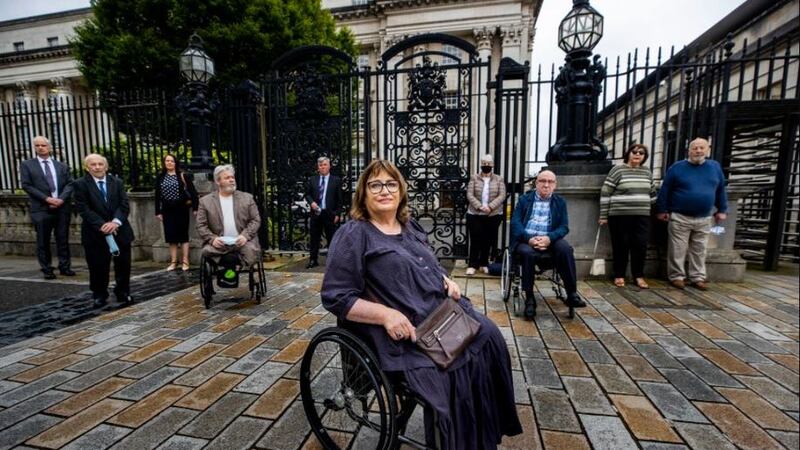Northern Ireland's Executive Office deliberately and unlawfully refused to advance a pensions scheme for victims of the Troubles, a High Court judge ruled today.
Mr Justice McAlinden held that Deputy First Minister Michelle O'Neill is still not complying with a legal obligation to designate a Stormont department to oversee payments in a bid to force the British government into providing funding.
In a scathing verdict, he described claims that it was permissible to delay allocation of the compensation programme for political reasons as "arrant nonsense".
The judge declared: "What is in reality being done is that the Executive Office is deliberately stymieing the implementation of the scheme in order to pressure the Secretary of State to make a different scheme which will be substantially directly funded by Westminister and which will have very different entitlement rules."
Rejecting claims that it was a legitimate stance aimed at forcing changes, he added: "This is a truly shocking proposition.
"It demonstrates either wilful disregard for the rule of law, or abject ignorance of what the rule of law means in a democratic society."
With immediate action now expected before a final order is made in seven days, he expressed hope that the finding of illegality will set in motion a chain of events towards grant funding being provided.
The determination came in legal challenges by two victims to the continued impasse around introducing the scheme with an estimated cost of £100 million.
Jennifier McNern lost both legs in an IRA bomb attack on the Abercorn Restaurant in Belfast city centre in March 1972. Proceedings were also brought by Brian Turley, one of the so-called 'Hooded Men' detained and subjected to special interrogation methods by the British military in the early 1970s.
Even though legislation was passed for the pension scheme which should have opened for applications in May, it remains in limbo due to a dispute over eligibility for payments.
Under new guidance anyone convicted of causing serious harm during the Troubles would be ruled out.
Sinn Féin claims the British government policy is discriminatory and could unfairly exclude thousands of people within the republican communities.
Throughout the hearing the judge repeatedly indicated that Ms O'Neill, the party's most senior representative in the Stormont administration, is ignoring the rule of law by her stance.
Counsel for the Executive Office accepted the pensions regulations required the designation of a department, but contended that there was no particular timeframe.
Political issues for the delay involved a dispute between London and Belfast over who should pay for the scheme.
Mr Justice McAlinden noted that First Minister Arlene Foster has now changed her stance and is prepared to immediately designate a department.
But he said the deputy first minister still appears to consider it appropriate and necessary to deliberately delay in order to put pressure on Westminster to provide substantial funding.
According to the judge, Ms O'Neill, as vice president of Sinn Fein, is also "implacably opposed" to the current eligibility criteria because many republicans with convictions could be ruled out.
Both the first and deputy first ministers could not have been under any misapprehension about their duty designate a department back in February, he said.
Instead, Justice McAlinden identified a deliberate refusal to comply with that obligation in the hope of extracting political concessions on funding and eligibility.
He rejected submissions that the the court should not adjudicate on issues of politics and policy.
"This argument does not withstand even the most cursory form of scrutiny. It is, in reality, arrant nonsense dressed up in the guise of reasoned legal argument," the judge said.
It was stressed that under no circumstances could the Executive Office's actions and stance be sanctioned or left unaddressed.
He added: "The rule of law also means that no one, regardless of their rank, position or status, is above the law and all must comply with the law as it applies to them, and the law as it applies to an individual or group must be applied in a non-discriminatory manner."
Outside court Mr Turley welcomed the ruling, insisting the Executive Office now has seven days to take immediate action on the pension scheme.
He was among 14 men brought by the British Army to a secret location where techniques including being forced to wear hoods, thrown to the ground from low-flying helicopters and then deprived of sleep, food and drink.
Known as the Hooded Men, they also endured continuous loud noise and prolonged wall-standing as part of the alleged torture methods.
Mr Turley said: "How do the Executive explain the profound unprofessionalism of their approach to victims?
"As a survivor of torture, I was left with long term injuries as a result of the actions of the state.
"The delay in having to wait on my right to a pension can only be described as another form of torture."
His solicitor, Darragh Mackin, maintained that victims have been denied compensation to which they are entitled.
"For Mr Turley, who has a previous conviction, today's ruling bears a personal significance," Mr Mackin explained.
"He, for too long, has been deprived of the redress to which he is entitled to as a victim of the horrendous treatment he sustained at the hands of the state."








